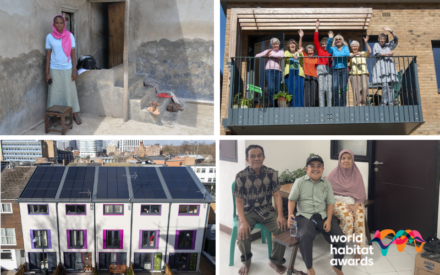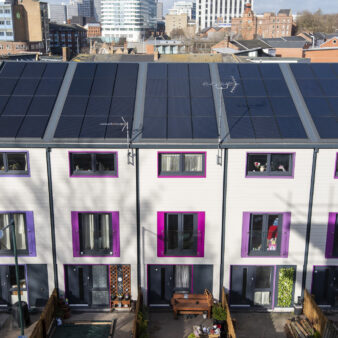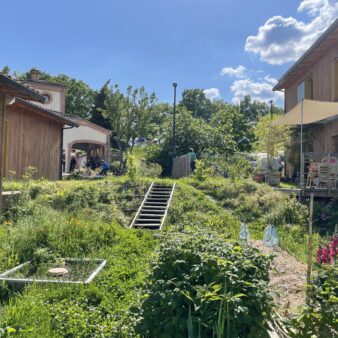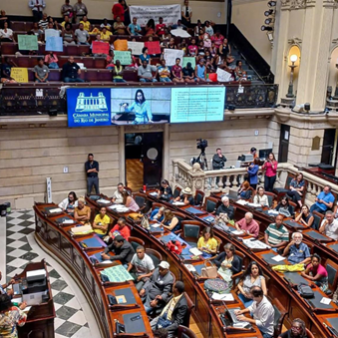
For 37 years, World Habitat has received a wide variety of award submissions from different regions, contexts, and communities. Each one is innovative in a unique way. Each one pushes the boundaries and develops creative solutions. Each one contributes to our shared learning, and the advancement of our work and practice, spreading outstanding housing solutions to a world stage. From tackling key global, structural housing issues such as greenhouse gas emissions, to preventing forced evictions, the World Habitat Award winners demonstrate exemplary practice, worthy of recognition, development, and replication.
Let’s have a look at some of the exceptional features of our 2024 winners!
Energiesprong, Netherlands (Gold Winner)
Tackling the widespread issue of home insulation and greenhouse gas emissions, the Global Energiesprong Alliance inserts prefabricated insulated wall and roof panels directly onto existing buildings. Additionally, it supports social housing providers to develop new financing models, making wholescale retrofitting economically viable.
Outstanding feature – fast and affordable retrofits for the social housing sector: The project supports housing providers to improve the quality and energy efficiency of their housing stock whilst at the same time prioritising the financial and liveability needs of tenants. The installations achieve a 70-80% reduction in the building’s energy use whilst lowering tenants’ energy bills in the long-term; an urgent priority given increasing fuel poverty. Because the panels are pre-fabricated, they can be installed in 7-10 days causing minimal disruption to tenants. This tenant-focused design cultivates demand and is able to scale-up rapidly. To date the organisation has completed 10,000 renovations in seven countries across Europe and North America.
Housing Rights in Jakarta: Collective Action and Policy Advocacy, Indonesia (Gold Winner)
Forced evictions – often led by a powerful state against marginalised populations – are rampant and incredibly challenging to successfully fight back against. In Jakarta, Jaringan Rakyat Miskin Kota Jakarta (JRMK) and the Rujak Center for Urban Studies and the Urban Poor Consortium (UPC) mobilised urban poor community members to stop the eviction of 256 people and helped 400 families who had already been evicted to return to their homes.
Outstanding feature – reclaiming democratic power at a local level : In a true reclamation of power, Jakarta’s urban poor have harnessed the agency of political channels to hold the Jakartan provincial government to account. Leveraging court cases, a contract with political candidates and their own voting power, the group created a better political climate, paving the way for regulations that protect residency rights. To ensure the longevity of these protections, five members of the affected communities are running in the upcoming national and provincial elections in 2024.
Programa de Habitabilidad Rural, Chile (Silver winner)
It is rare to see a government project that helps rural communities access a decent home to the same extent as their urban counterparts. The Chilean Ministry for Housing – setting an excellent precedent for the region – gives state funding and technical support to people in remote communities to build or improve their own homes. More than 40,000 people have already been helped through this project.
Outstanding feature – addressing rural housing needs at scale: The programme demonstrates that it is possible for the state to deliver large numbers of high quality, thermally efficient and culturally relevant new and improved homes in isolated and hard to access areas. Through effective collaboration between state, regional and municipal governments, residents and housing stakeholders, the programme meets the needs of people living in rural areas in a holistic way, improving not only their living environments, but also their quality of life. This model for rural development offers a hopeful path towards bridging regional disparities and ensuring everyone has access to a safe and secure home.
La Cigue, Switzerland (Silver winner)
University accommodation is and burdens students in Geneva, one of Europe’s most expensive cities. Student housing cooperative La Ciguë, which manages 740 rooms in the city, has developed a housing model that offers student accommodation at a 55% discount on open market rental rates.
Outstanding feature – elongating the life of empty buildings: While 40% of La Ciguë’s rentals are its own, 60% of its stock comes from empty city centre properties awaiting renovation or demolition. La Ciguë manages temporary lease agreements with private owners, public bodies and non-profit organisations to house students in otherwise empty buildings. The model aligns well with students’ temporary housing needs as most students only need a home for the duration of their course.
CO-HATY, Ukraine (Bronze winner)
To provide housing amid conflict is an impressive feat in itself but to do so to the quality of METALAB in Ukraine is just remarkable. Since the outbreak of the Russian invasion of Ukraine to date, METALAB has renovated seven buildings providing homes for around 1300 Internally Displaced People (IDPs).
Outstanding feature – providing home-from-home comfort for people displaced by war: The level of care, comfort and detail featured in CO-HATY’s temporary accommodation is remarkable and worthy of high praise. Through its network of over 25 partners including housing non-profits, legal organisations, social services and humanitarian organisations, it instils communities with a sense of ownership, solidarity, purpose and care. As the conflict draws on, Co-HATY is providing a solution to the dire shortage of social housing common in Central and Eastern Europe, by tackling feasibility, policy and legal issues related to the long-term use of buildings by IDPs.
New Ground Co-housing, United Kingdom (Bronze winner)
New Ground Cohousing is the UK’s first group-living community for women aged 58-94 who live in their own homes while sharing social spaces and managing community life together. New Ground is a housing model that combats the common problems of isolation, loss of personal agency, lack of diversity and economic hardship that affect older people. It provides an effective solution for increased housing demand amongst aging populations, particularly across the Global North.
Outstanding feature – diversity and inclusion in later life: Given the self-selection process used for acquiring tenants, co-living and cooperative housing models are at risk of creating communities from similar socio-economic demographics. New Ground Cohousing pro-actively pushes back against that by offering mixed-tenure flats (rare among co-living communities) where some apartments are rented out as social housing. In London, this averages at about £116 GBP per week.
Berlin Nettelbeckplatz, Germany (Bronze winner)
The Nettelbeckplatz approach is an innovative way of re-thinking urban renewal, cooperative values and social cohesion. Through converting old buildings to be both energy efficient and affordable, diverse and community driven, Nettelbeckplatz answers challenges familiar to urban authorities across the world.
Outstanding feature – a building upgrade fit for the future: Nettelbeckplatz integrates social care and community values with large scale energy-efficient renovations. The housing estate was both socially and infrastructurally in disrepair, and yet this project treated its physical conversion as an opportunity to revive the social fabric; it diversified tenants to include people from all backgrounds, provided new assisted living units for older tenants while creating new spaces for social engagement – all contained within the same footprint as the original 1970’s construction.
Although extensive weather forecasting systems are available, they are often unintelligible or impractical for communities experiencing the worst of extreme weather conditions. Resurgence, a global social enterprise, worked with international, national and local organisations, hand in hand with communities in Kenya and Tanzania to design an accessible weather forecasting and early warning system for two of the largest informal settlements in East Africa. Looking forward, DARAJA hopes that 25% of the 1 billion people living in informal settlements worldwide will be able to access its services by 2030
Outstanding feature – empowering communities to fight the climate emergency: DARAJA fuses various communication channels used in informal settlements – for example local radio stations, art installations, community hubs – with official weather forecasting expertise and advice. Through community involvement, DARAJA developed easy-to-understand icons for weather reports, tailored to local languages and contexts, delivered in a timely way via radio, tv broadcasts and community leaders on the ground. It is believed that accessing the service has led to a 300% increase in household repairs made in response to weather forecasts in Nairobi, and a 122% increase in Dar es Salaam.
This year’s award winners have once again showcased the ingenuity and dedication of individuals and organisations working for a world where everyone has a safe and secure home in a thriving community.
But our 2024 winners, previous awardees and those of the future need your support. Read on to find out how you can get involved:
- Join us for an online webinar on Thursday 22 February 2024 (12.00 GMT), for the World Habitat Awards 2024 Celebration – Tackling Global Housing Challenges through Outstanding Solutions
- Spread the word! Press the ‘Share’ button in the top right of our website pages to spread the news about the awards with your network and encourage others to nominate impactful housing projects every year from January until the beginning of March.
- Stay connected. Sign up for the our newsletter to receive updates and follow us on social media for inspiring stories and insights.
- Get in touch with us to find out how your organisation can provide funding or structural support to these amazing Award Winners.
Together, we can build a brighter future where everyone has a place to call home. Let’s celebrate the achievements of our 2024 winners and use them as a springboard for further progress in 2025 and beyond.




Join the discussion